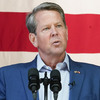[ad_1]

Georgia Gov. Brian Kemp won his Republican primary with broad support, though former President Donald Trump backed a well-known challenger to the incumbent.
John Bazemore/AP
hide caption
toggle caption
John Bazemore/AP

Georgia Gov. Brian Kemp won his Republican primary with broad support, though former President Donald Trump backed a well-known challenger to the incumbent.
John Bazemore/AP
Former President Donald Trump has been a near-constant presence in this year’s Republican primaries. Candidates have eagerly sought his endorsement, with some making a pilgrimage to his Mar-a-Lago estate to ask for his support in person.
Trump has at times used his endorsement as a tool of revenge, in an attempt to take down GOP officeholders who have crossed him — most notably those who did not support his effort to overturn the results of the 2020 election.
But with several weeks of primaries now complete, a trend has emerged: Republican voters — even those who maintain Trump was a great president — are not marching in lockstep with him. Many are instead bucking his endorsements.
“Republican voters are not monolithic,” veteran GOP strategist Dallas Woodhouse said. “They are not falling all over each other waiting to hear who Trump endorses to make their decision.” Yes, it is a factor, Woodhouse added, “and it can be a big factor, but it’s not necessarily the determinant factor.”
Some voters undoubtedly have been waiting on Trump. Take Kathy Deal, for instance. When she spoke with NPR back in March, the resident of Lancaster, Ohio, was undecided and eager to hear from Trump on the state’s Republican candidates for U.S. Senate.
“That would definitely seal it for sure, it would seal it,” Deal said, weeks before Trump made a late endorsement of Hillbilly Elegy author J.D. Vance, who would go on to win the nomination.
It was a very different story for one voter weeks later in Pennsylvania. Seventy-one-year-old Trump supporter Bob Rapp was not pleased that the former president had endorsed celebrity TV doctor Mehmet Oz in the GOP Senate contest there. Rapp told NPR in April that he doesn’t think Oz is even a conservative.
“Some of his stances have been pretty liberal on his TV show,” Rapp said. “I’m just concerned that he may be a RINO [Republican in name only].”
But that didn’t mean being at odds with Trump over Oz had affected his strong admiration for the former president.
“No, because it’s his prerogative,” Rapp said. “You don’t agree with your leaders 100% of the time.” He maintained firmly that Trump’s endorsement wouldn’t sway him.
Oz did eventually win the nomination in an extremely close contest. Rapp told NPR later that he voted for businessman Dave McCormick, who conceded during a recount.

Though Mehmet Oz, a Trump-backed Republican candidate for U.S. Senate in Pennsylvania, narrowly won his primary, many conservative voters had doubts about him.
Ted Shaffrey/AP
hide caption
toggle caption
Ted Shaffrey/AP
A solid success rate, but in key races it’s a mixed bag for Trump
Taking a broad look at how Trump’s endorsements have fared so far, his win-loss record is strong, but a lot of that is because mostly he backs popular incumbents or frontrunners, like Pennsylvania gubernatorial candidate Doug Mastriano, who didn’t really need his support to secure a nomination.
In other contests Trump’s record is more mixed.
“Trump’s endorsement is not a magic wand or a silver bullet,” said Sarah Longwell, a longtime GOP consultant and the publisher of The Bulwark website.
She’s been watching the impact of Trump endorsements and notes that in certain situations it can provide a big boost, especially in highly competitive races with lots of candidates. In such contests, Trump’s support can mean more press coverage and create momentum. Longwell says that’s what happened in Ohio’s U.S. Senate primary.
“Where there’s a big group of Republicans, and they’re all battling it out, and they’re all telling the voters how terrible their opponents are, and people are kind of not sure who they like, and when Trump comes in with an endorsement, it tends to kind of elevate people in these races,” she said.
Longwell says that laundry list of factors all aligned to help Vance win in Ohio.
But not all of Trump’s picks get such a boost, especially when they are the challenger attempting to knock off an incumbent with high name recognition and a track record.
Take Georgia, where Trump put his credibility on the line by endorsing challengers to a pair of Republican incumbents — Gov. Brian Kemp and Secretary of State Brad Raffensperger. Both men crossed Trump when they rebuffed his requests that they use their power to overturn Trump’s loss in Georgia in the 2020 election. Trump based his endorsements in these races entirely on his lie that the 2020 election was stolen, and that these two elected officials betrayed him by not supporting him in that falsehood.
But there was a problem for Trump in these contests: Kemp and Raffensperger each had a broad base of support among GOP voters, and each had a record of accomplishment that could compete with Trump’s bid for vengeance.
Longwell has been conducting regular focus groups with Trump supporters. In a session with Georgia voters, she heard from people like Laura (focus group members are only identified by their first name), who was still undecided about her vote, but who still had good things to say about the governor.
“I like what Brian Kemp has done,” Laura said, “and I liked how he handled COVID.” Then for emphasis, she added: “The state seems to be running smoothly to me.”
It’s not known who Laura eventually cast her ballot for, but it is known that Kemp won reelection by a margin of more than 50 percentage points. Raffensperger won his primary too, also by a substantial margin of 19 points.
Then there’s an example in North Carolina, where even a Trump endorsement couldn’t save scandal-plagued Congressman Madison Cawthorn in his primary.
GOP strategist Woodhouse says Trump may have actually helped Cawthorn in what was a very tough primary from a conservative challenger. At the very least, Woodhouse said, “Nobody is going to blame the president for Cawthorn’s loss because Cawthorn had had a long series of self-inflicted wounds.”
Still, he says, it does help demonstrate how a Trump endorsement has limits.
When Trump’s pick loses, a Trump-like figure still wins
Woodhouse says a key part of all this is the overall makeup of the races in Republican primaries this year — and likely into the near future.
In contest after contest, voters are not choosing between a Trump-endorsed candidate and an anti-Trump candidate. Most every GOP hopeful runs on a pro-Trump list of issues. Sometimes that includes support for the lie that Trump really won in 2020, but it also always includes support for Trump’s positions and rhetoric on issues like building a southern border wall and getting tough with China on trade — with lots of cultural issues thrown in.
“I mean, any candidates going forward are going to adopt those core issues that were part of the America First agenda,” Woodhouse said.
So even if his candidate loses, Trump’s issues are very much on the winning side in these primaries.
And there’s another potentially significant impact Trump is having in the primaries: He’s endorsing candidates far down the ballot, for local races, something unheard of for a former president.
Longwell said that allows Republicans to increase their presence in key local offices that don’t typically get a lot of attention on Election Day, “which allows people who are totally unknown, and maybe even in many cases running unopposed for offices that people pay almost no attention to, to raise some money, to gain some profile.”
For the GOP, she said, it’s a matter of building a deep bench of officeholders “to really fill that with people who are very much in Donald Trump’s image.”
And that could end being Trump’s biggest impact on the 2022 elections.
[ad_2]
Source link


